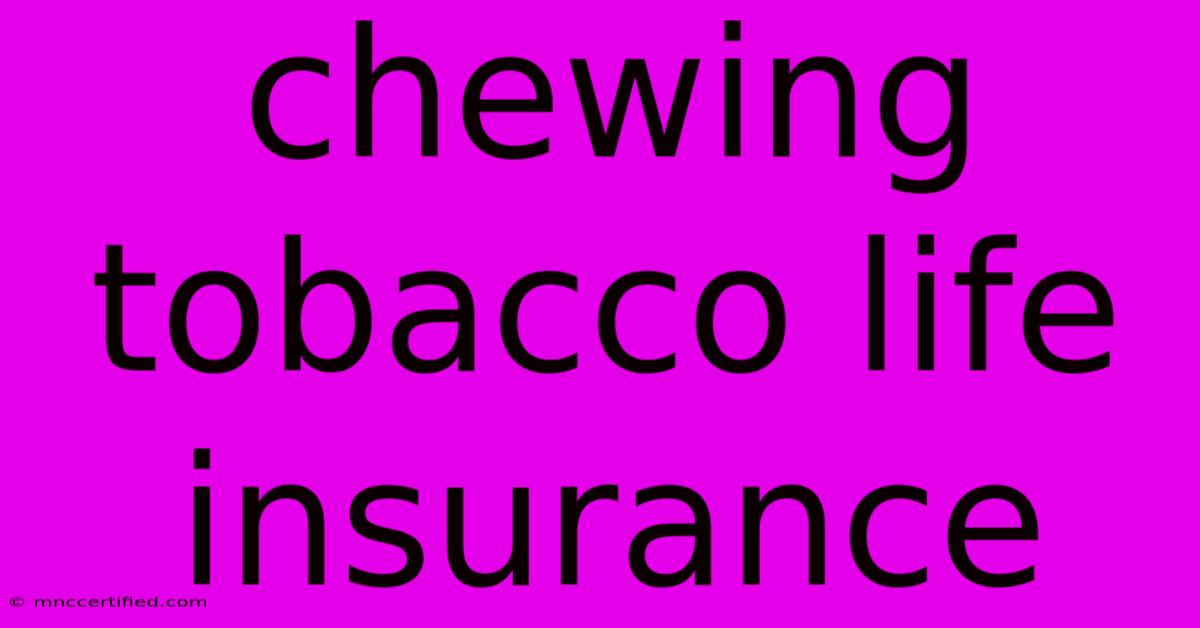Chewing Tobacco Life Insurance

Table of Contents
Chewing Tobacco and Life Insurance: A Risky Combination
Chewing tobacco, like all forms of tobacco, significantly increases your risk of developing serious health problems. This increased risk directly impacts your life insurance eligibility and premiums. Understanding this connection is crucial if you use chewing tobacco and are considering life insurance. This article will explore the implications of chewing tobacco on your life insurance application and offer advice on navigating this complex issue.
The Impact of Chewing Tobacco on Life Insurance
Life insurance companies assess risk based on various factors, including your health, lifestyle, and family history. Chewing tobacco is a major red flag because it's linked to numerous life-threatening conditions:
- Oral Cancer: Chewing tobacco is a leading cause of oral cancers, including cancers of the mouth, tongue, throat, and esophagus. These cancers are often aggressive and difficult to treat.
- Heart Disease: Tobacco use, including chewing, significantly increases the risk of heart disease, stroke, and other cardiovascular problems.
- Lung Cancer: While less directly linked than smoking, chewing tobacco still exposes you to carcinogens that can lead to lung cancer.
- Pancreatic Cancer: Studies show a strong correlation between chewing tobacco and an increased risk of pancreatic cancer.
Because of these increased health risks, life insurance companies view chewing tobacco users as higher-risk individuals. This translates into:
- Higher Premiums: You'll likely pay significantly higher premiums compared to non-tobacco users. The increase can be substantial, making life insurance more expensive.
- Increased Scrutiny: Your application will undergo stricter scrutiny. You might be required to undergo additional medical examinations or provide more detailed health information.
- Denial of Coverage: In some cases, your application might be denied altogether, leaving you without the crucial financial protection life insurance provides.
Types of Life Insurance and Chewing Tobacco
The impact of chewing tobacco varies slightly depending on the type of life insurance policy you're seeking:
- Term Life Insurance: This type of insurance offers coverage for a specific period. Chewing tobacco will almost certainly lead to higher premiums or denial.
- Whole Life Insurance: This offers lifelong coverage, but the impact of chewing tobacco on premiums and eligibility remains significant.
Improving Your Chances of Approval
If you use chewing tobacco and need life insurance, here's what you can do to improve your chances of approval and securing more favorable rates:
- Quit Chewing Tobacco: The most effective way to improve your insurability is to quit. The longer you've quit, the better your chances of obtaining better rates. Consider seeking help from your doctor or a support group.
- Full Disclosure: Be completely honest about your chewing tobacco use on your application. Lying or omitting information will likely result in your application being denied or your policy being voided later.
- Shop Around: Compare quotes from multiple life insurance companies. Some might have slightly more lenient policies than others. Don't assume one rejection means you're ineligible everywhere.
- Consider Alternative Policies: Explore alternative life insurance products that might be more accessible, such as no-exam life insurance, although these often come with limitations.
The Importance of Transparency
It's crucial to be upfront and transparent with life insurance companies about your chewing tobacco use. This transparency, coupled with a genuine commitment to quitting, can significantly improve your chances of securing affordable and appropriate life insurance coverage.
Conclusion: Protecting Your Future
Chewing tobacco poses significant risks to your health and your ability to obtain affordable life insurance. Quitting is the best way to mitigate these risks and secure better rates. By being honest with insurance providers and proactively addressing your tobacco use, you can take control of your future and protect your loved ones. Remember to consult with a qualified insurance professional for personalized guidance. They can help you navigate the complexities of life insurance applications and explore options that best suit your circumstances.

Thank you for visiting our website wich cover about Chewing Tobacco Life Insurance. We hope the information provided has been useful to you. Feel free to contact us if you have any questions or need further assistance. See you next time and dont miss to bookmark.
Featured Posts
-
Scottsdale Police Identify Bissonnette Fight Suspects
Nov 27, 2024
-
This Morning Bonnie Blues Controversial Words
Nov 27, 2024
-
Vanderpump Rules Returns For Season 12
Nov 27, 2024
-
Man City Vs Feyenoord 3 3 Match Analysis
Nov 27, 2024
-
Post Season Vanderpump Rules Cast
Nov 27, 2024